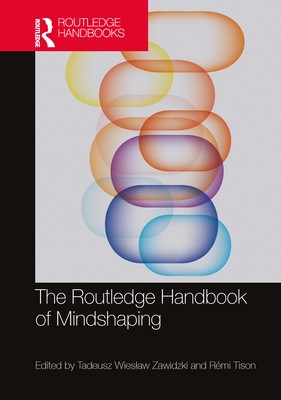
- Išsiųsime per 10–14 d.d.
- Leidėjas: Routledge
- ISBN-10: 1032639199
- ISBN-13: 9781032639192
- Formatas: 17 x 24.4 x 2.9 cm, kieti viršeliai
- Kalba: Anglų
- Extra -15 % nuolaida šiai knygai su kodu: ENG15
The Routledge Handbook of Mindshaping + nemokamas atvežimas! | knygos.lt
Atsiliepimai
Aprašymas
Of all species, human beings are uniquely capable of coordinating on long-term, large-scale cooperative projects with unfamiliar and genetically unrelated others. According to the mindshaping hypothesis, this relies on mechanisms and practices like imitation, pedagogy, normative cognition, and narrative self-constitution, which shape us into expert coordinators, without requiring time consuming and epistemically fraught attempts to read each other's minds. Mindshaping has been applied to many areas of inquiry, including game theory, shared agency, communication, the ontogeny of human cognition, the dissemination of scientific knowledge in popular media, mental illness, and the influence of social media technologies.
The Routledge Handbook of Mindshaping is the first volume of its kind. Comprising thirty-seven chapters by an international team of leading scholars, the Handbook is organised into seven sections:
- Mindshaping and Coordination
- Mindshaping and Cognitive Psychology
- Mindshaping and Normativity
- Mindshaping and Epistemology
- Social and Political Dimensions of Mindshaping
- Nonhuman Mindshaping
- Mindshaping Applied.
Within these sections key topics are addressed, including: game theory, social signalling and shared agency, folk psychology, the emotions, language acquisition and memory, stereotyping and consciousness-raising, moral agency, self-knowledge, rationality, epistemic norms, primate sociality, human-elephant relations, artificial intelligence, mental illness and neurodiversity, aesthetic expression and politics.
An outstanding survey of a vibrant and emerging field, The Routledge Handbook of Mindshaping will be of great interest to those studying and researching philosophy of psychology, philosophy of cognitive science, philosophy of mind and applied epistemology. It will also be of interest to those in related disciplines such as cognitive psychology, sociology and anthropology.
EXTRA 15 % nuolaida su kodu: ENG15
Akcija baigiasi už 6d.16:54:23
Nuolaidos kodas galioja perkant nuo 10 €. Nuolaidos nesumuojamos.

- Leidėjas: Routledge
- ISBN-10: 1032639199
- ISBN-13: 9781032639192
- Formatas: 17 x 24.4 x 2.9 cm, kieti viršeliai
- Kalba: Anglų
Of all species, human beings are uniquely capable of coordinating on long-term, large-scale cooperative projects with unfamiliar and genetically unrelated others. According to the mindshaping hypothesis, this relies on mechanisms and practices like imitation, pedagogy, normative cognition, and narrative self-constitution, which shape us into expert coordinators, without requiring time consuming and epistemically fraught attempts to read each other's minds. Mindshaping has been applied to many areas of inquiry, including game theory, shared agency, communication, the ontogeny of human cognition, the dissemination of scientific knowledge in popular media, mental illness, and the influence of social media technologies.
The Routledge Handbook of Mindshaping is the first volume of its kind. Comprising thirty-seven chapters by an international team of leading scholars, the Handbook is organised into seven sections:
- Mindshaping and Coordination
- Mindshaping and Cognitive Psychology
- Mindshaping and Normativity
- Mindshaping and Epistemology
- Social and Political Dimensions of Mindshaping
- Nonhuman Mindshaping
- Mindshaping Applied.
Within these sections key topics are addressed, including: game theory, social signalling and shared agency, folk psychology, the emotions, language acquisition and memory, stereotyping and consciousness-raising, moral agency, self-knowledge, rationality, epistemic norms, primate sociality, human-elephant relations, artificial intelligence, mental illness and neurodiversity, aesthetic expression and politics.
An outstanding survey of a vibrant and emerging field, The Routledge Handbook of Mindshaping will be of great interest to those studying and researching philosophy of psychology, philosophy of cognitive science, philosophy of mind and applied epistemology. It will also be of interest to those in related disciplines such as cognitive psychology, sociology and anthropology.




Atsiliepimai